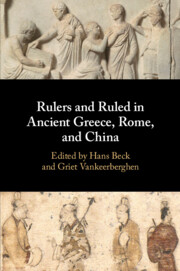Book contents
- Rulers and Ruled in Ancient Greece, Rome, and China
- Rulers and Ruled in Ancient Greece, Rome, and China
- Copyright page
- Contents
- Figures
- Tables
- Maps
- Contributors
- Preface
- Chronology of the Ancient Mediterranean
- Chronology of Ancient China
- Maps of Ancient China, Greece, and Rome
- The Many Faces of “the People” in the Ancient World
- Part I Authority and Lifestyles of Distinction
- Part II The People as Agents and Addressees
- Part III Inversions of the People: Emperors and Tyrants
- Chapter 8 Augustus, the Roman Plebs and the Dictatorship
- Chapter 9 Liberation as Burlesque
- Chapter 10 Historical Necessity or Biographical Singularity?
- Chapter 11 Employing Knowledge
- Part IV Identities and “Others”
- Glossary
- Index
- References
Chapter 10 - Historical Necessity or Biographical Singularity?
Some Aspects in the Biographies of C. Iulius Caesar and Qin Shi Huangdi
from Part III - Inversions of the People: Emperors and Tyrants
Published online by Cambridge University Press: 19 January 2021
- Rulers and Ruled in Ancient Greece, Rome, and China
- Rulers and Ruled in Ancient Greece, Rome, and China
- Copyright page
- Contents
- Figures
- Tables
- Maps
- Contributors
- Preface
- Chronology of the Ancient Mediterranean
- Chronology of Ancient China
- Maps of Ancient China, Greece, and Rome
- The Many Faces of “the People” in the Ancient World
- Part I Authority and Lifestyles of Distinction
- Part II The People as Agents and Addressees
- Part III Inversions of the People: Emperors and Tyrants
- Chapter 8 Augustus, the Roman Plebs and the Dictatorship
- Chapter 9 Liberation as Burlesque
- Chapter 10 Historical Necessity or Biographical Singularity?
- Chapter 11 Employing Knowledge
- Part IV Identities and “Others”
- Glossary
- Index
- References
Summary
For some decades now, the study of history seems to have tumbled into a deep identity crisis. On the one hand, the teleological model of History as equivalent to the ‘History of Progress’ is increasingly questioned: the undeniable advance of modern information technology has deepened social inequalities rather than levelling them, and the gradual decline of the Western world has challenged the very basis of our understanding of history which was, hitherto, grounded in the idea that history inevitably tended to the victory of democracy, liberty, and rationality, and that these utterly Western values were necessarily superior to the allegedly traditional values of other cultures.
- Type
- Chapter
- Information
- Rulers and Ruled in Ancient Greece, Rome, and China , pp. 328 - 368Publisher: Cambridge University PressPrint publication year: 2021



